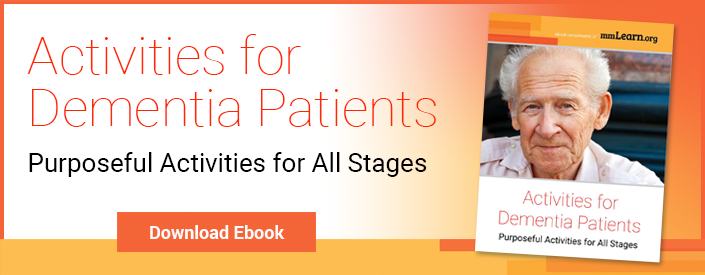 It can be difficult for caregivers and family members to hear that a loved one has dementia.
It can be difficult for caregivers and family members to hear that a loved one has dementia.
When their memory, reasoning, and judgment show signs of impairment, we worry that we are losing the person we have known. But it’s important to recognize that dementia is not a disease; it’s a collection of symptoms. And some of those symptoms can be managed through medical care and dementia activities.
Recognizing dementia symptoms can help caregivers by providing valuable information about what’s happening to a person they care for.
It’s the first step toward living the best life possible with a person who is changing in ways that are difficult to understand.
Types of Memory Impairment
The first criterion for dementia is memory impairment. There are several types of memory that dementia affects.
- short‑term memory (what happened 5 minutes ago)
- long‑term memory (what happened one or 30 years ago)
- verbal memory (names and events)
- motor skills (riding a bike, cooking)
However, memory impairment alone does not constitute dementia. In addition to memory impairment, a person with dementia will also have one of the following dementia symptoms:
- Aphasia. Does your loved one struggle to find and say the right words, even though they are capable of physical speech? Expressive aphasia is when a person can’t find a word for an object or uses the wrong word.
- Apraxia. Apraxia is when a person struggles with motor abilities and is not able to manipulate an object, for example folding a piece of paper.
- Agnosia. Even though a person might have intact sensory hardware, agnosia affects them in a way that they might not be able to identify an object. If a doctor hands them a paper clip or a coin while their eyes are closed, they would not be able to say what it is.
- Executive function impairment. This impairment affects a person’s ability to plan, organize, sequence, control and monitor their own behaviors. (We’ll expand on this below.)
- Functional impairment. This is when a patient is no longer able to perform self‑care activities, like toileting, grooming, or bathing. Or when they are no longer able to walk around the neighborhood, use the telephone, or manage money or medications. They need help to function in their daily lives.
Signs of Executive Function Impairment
Executive function impairment affects the brain's frontal lobe functioning. It is a serious issue for people with dementia because it makes performing complex tasks— like driving or cooking— difficult.
Sometimes, this type of impairment affects judgment and insight. They might be interrupted in the middle of a task, and forget what they were doing. This can be dangerous, and frightening. There are emotional consequences as well, as people lose the ability to do certain things independently.
Executive function impairment often causes people to become dependent on routine. They are fearful when something changes in their environment.
If you are caring for someone who is experiencing any combination of these symptoms, it may be time to talk to a health care professional.
Caring for Someone with Dementia
Knowledge is power. And when it comes to dementia, the more we know about the condition, the better we are able to care for our loved ones. Our free eBook, Most Common Types of Dementia: A Caregiver’s Guide to Alzheimer’s Disease, Vascular Dementia, Lewy Body Dementia and More is a good place to start.
If you are already caring for someone with dementia, our dementia activities book is full of purposeful activities designed by an experienced caregiver to challenge and occupy people with dementia.
In one of our mmLearn caregiver training videos, Dr. Thomas Weiss provides an overview of dementia. He defines the condition and explains the history, genetics, and risk factors. He outlines some promising scientific studies on physical and mental stimulation and prevention. He also underlines the support that caregivers need when undertaking the difficult yet necessary work of caring for someone with dementia.
Dr. Weiss believes that we are in the “infancy of diagnosis/treatment” for dementia. “The future will be vastly different,” he says. “Be of good cheer, and most of all, remain hopeful.”

